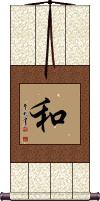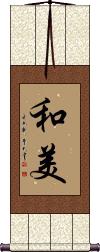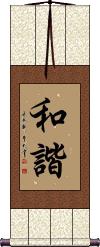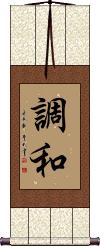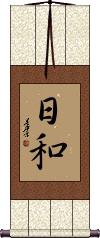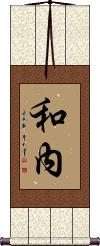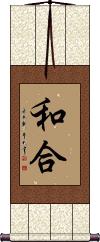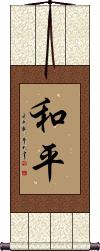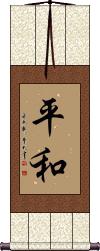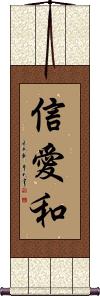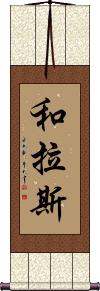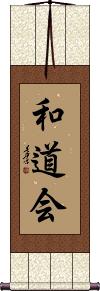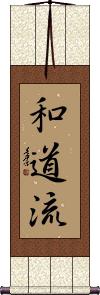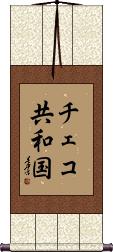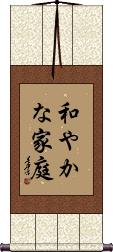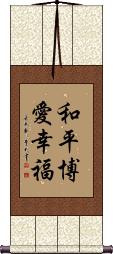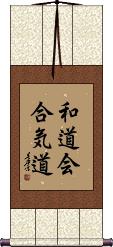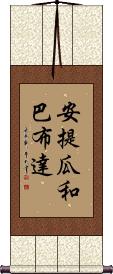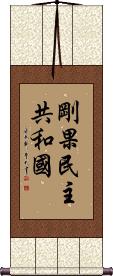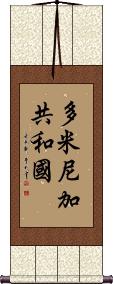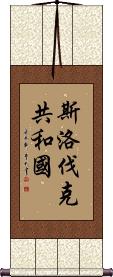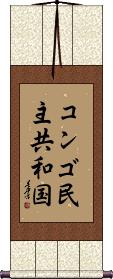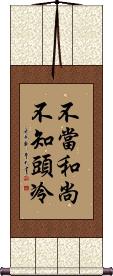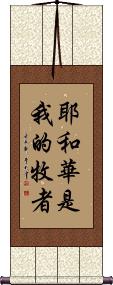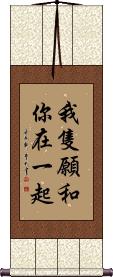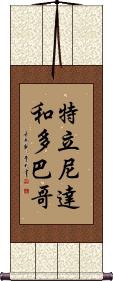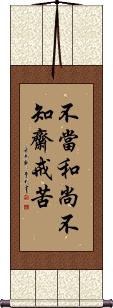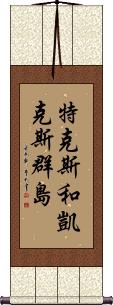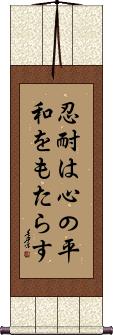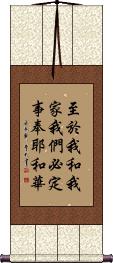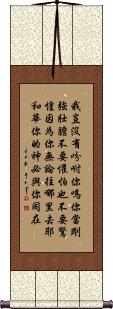Many custom options...
And formats...

和 in Chinese / Japanese...
Buy an 和 calligraphy wall scroll here!
Personalize your custom “和” project by clicking the button next to your favorite “和” title below...
2. Beautiful Life / Life in Perfect Harmony
4. Hiyori
5. Honey
10. Horace
11. Jehovah
12. Wado-Kai
13. Wado-Ryu
14. Happy Family
15. Perfect Harmony
16. House Of Peace
17. Kokoro no Heiwa
18. Life in Harmony / Balanced Life
19. Peace and Love
20. Elements of the Tea Ceremony
22. World Peace
25. Republic of Mali
26. Nature in Balance / Balanced Nature
27. Peaceful Warrior
29. Wado-Ryu Karate
30. Czech Republic
31. Happy Family
33. Wado-Kai Aikido
36. Democratic Republic of the Congo
38. Eternal Peace and Happiness
39. Slovak Republic
40. Democratic Republic of the Congo
41. To Know Hardship, One Must Experience It
45. If you have not been a monk, how can you know what it is like to be a vegetarian?
47. Patience Brings Peace of Mind
48. Joshua 24:15
50. Joshua 1:9
Peace / Harmony
和 is the simplest form of peace and harmony.
和 can also be translated as the peaceful ideas of gentle, mild, kind, and calm. With a more harmonious context, it can be translated as union, together with, on good terms with, or on friendly terms.
Most people would just translate this character as peace and/or harmony. 和 is a very popular character in Asian cultures - you can even call it the “peace symbol” of Asia. In fact, this peace and harmony character was seen repeatedly during the opening ceremony of the 2008 Olympic Games in Beijing (a major theme of the games).
In old Chinese poems and literature, you might see this used as a kind of "and." As in two things summed together. As much as you could say, "the sun and moon," you could say "the sun in harmony with the moon."
Beautiful Life / Life in Perfect Harmony
和美 is a word that means “harmonious” or, “in perfect harmony.”
The deeper meaning or more natural translation would be something like, “beautiful life.”
The first character means peace and harmony.
The second character means beautiful. But in this case, when combined with the first character, beautiful refers to being satisfied with what you have in your life. This can be having good relations, good feelings, comfort, and having enough (with no feeling of wanting).
Note: In Japanese, this is often used as the name "Wami." This title is probably more appropriate if your audience is Chinese.
Harmony / Balance
和諧 is a word that means harmonious, harmony, concordant, or balanced in Chinese.
In Korean Hanja, it sometimes means reconciliation or compromise.
Harmony / Balance
Cho Wa
調和 is one of the several ways to express harmony in Chinese and Japanese.
Note: The first character means harmony but also suggests a musical meaning. It can also describe warriors marching in perfect cadence (in step) or to regulate something.
The second character carries the meaning of harmony and peace by itself.
Together, these characters create a word that can be defined as harmonious, to mediate, to reconcile, to compromise; mediation, temper, to mix, blend, blended, season, seasoning (getting the flavors of the food in balance), to placate, or be in harmonious proportion.
The meaning varies depending on the context. However, when hanging as a wall scroll, this will refer to the person (you) being balanced and in harmony while rational and under control simultaneously.
Hiyori
Honey
One Mind / Unity
和合 means to blend, unite, or be of one mind.
和合 is usually used as a Buddhist term. It can also be defined as harmony, concord, agreement, unity, union, and harmonize/harmonization.
Peace of Mind
和平 is the Chinese order for these two characters, which means peace but can also be translated as amicability, specifically, or mildness. 和平 is often translated as a simple way to say “peace of mind.” This combination is used in Korean Hanja to mean “peace and harmony.”
Alone, the first character means peace and harmony.
The second character means balance when read by itself.
Note: 和平 are often seen in the opposite order in Japanese with the same meaning (You'll sometimes find them in this order in Japan, so either way is OK).
Peace / Peaceful
平和 is the Japanese and Korean order of these characters used most often to express the idea of peace, tranquility, and harmony.
It's just the reverse order of the Chinese. In this order in Chinese, it means takes the “mild” definition rather than “peace.” In Korean, the combination keeps the same meaning in either order.
The second character also means balance, so there is an element of harmony and balance along with peace.
Faith Love Peace
Horace
Jehovah
Wado-Kai
Wado-Kai is used as a title for styles of Karate and Aikido.
Breaking down the characters into the proper Japanese Romaji, you have “wa dou kai” or “wa dō kai.” The meaning is roughly-translated as “Harmony Way Club” or “Peace Method Association.” The first Kanji should probably be read as harmony, rather than peace in this case.
Wado-Ryu
Style of Karate or Jujitsu
和道流 or Wado-Ryu is a style of Karate or Jujutsu (Jujitsu).
Note: Many will argue whether this is a style of Karate or Jujutsu.
While some find Wado-Ryu similar to Shotokan Karate, enough differences exist in perspective and technique that it stands by itself.
Breaking down the characters into the proper Japanese Romaji, you have “wa dou ryuu” or “wa dō ryū.” The meaning is roughly-translated as “Harmony Way Style” or “Peace Method Style.” The first Kanji should probably be read as harmony rather than peace in this case.
Happy Family
和諧之家 means “harmonious family” or “happy family” in Chinese.
The first two characters relay the idea of happiness and harmony.
The third character is a connecting or possessive article (connects harmony/happiness to family).
The last character means family but can also mean home or household.
Perfect Harmony
琴瑟和鳴 is a Chinese title that means “in perfect harmony” or “in sync.”
This can translate as “two harps in harmony.” While this more literally means “qin [and] se harmonious sound.”
The qin and se are both types of string instruments (Chinese zithers) that are known to play in perfect harmony. Thus, the two together are often used as a metaphor for marital harmony or a happy marriage.
House Of Peace
Kokoro no Heiwa
Life in Harmony / Balanced Life
Harmonious Life
This 和諧生活 title suggests that you have, or want to get your life in balance.
The first two characters regard the idea of balance, harmony, and peace.
The second two characters mean “life.” More specifically this refers to your livelihood, career, and the daily activities that comprise your life or living. Some would translate those two characters as “one's daily existence.”
Note: We have a couple of titles for this idea. This version is more of a noun, thus "The Balanced Life" verses a verb form like "Balancing [Your] Life."
Life in Harmony / Balanced Life
調和生活 is a Japanese title that suggests that you have, or want to get your life in balance.
The first two Kanji mean harmonious or in harmony.
The second two Kanji mean “life.” More specifically this refers to your livelihood, career, and the daily activities that comprise your life or living.
Peace and Love
和平博愛 is the Chinese and Japanese way to express “Peace and Love.”
These are two separate words, so the calligrapher will put a slight space between the first two characters, which mean peace, and the last two, which represent universal love. This space is not shown on the sample character images for this phrase.
A special note: Word lists may seem okay in English but feel strange in Chinese and Japanese. We don't offer too many of them but this one is often-requested and feels okay in Chinese and Japanese, though a bit uncommon in Korean.
Elements of the Tea Ceremony
Wa Kei Sei Jaku
和, 敬, 清, 寂 or Wa, Kei, Sei, Jaku are the principles of the way of tea or 茶道.
The meanings are:
Harmony 和 (wa).
Respect 敬 (kei).
Purity 清 (sei).
Tranquility 寂 (jaku).
These principles or tenets were created by tea master Sen Rikyu (1522-1591). More about these ideas: Chanoyu
Warrior for Peace
World Peace
World Peace
Central African Republic
Chowa-Ryu Jujitsu
Republic of Mali
Nature in Balance / Balanced Nature
Peaceful Warrior
Peaceful Warrior
平和の武士 can be read as “Peaceful Warrior” or “Warrior for Peace” in Japanese. This sounds like an oxymoron in Japanese, so it's a weird title. Expect Japanese people to be perplexed when they see it.
Character breakdown:
平和 (heiwa) peace; harmony.
の (no) possessive particle.
武士 (bushi) warrior; samurai; soldier.
Strength and Courage
Wado-Ryu Karate
Czech Republic
Happy Family
和やかな家庭 means “happy family” or “harmonious family” in Japanese.
The first three Kanji create a word that means mild, calm, gentle, quiet, or harmonious. After that is a connecting article. The last two Kanji mean family, home, or household.
Note: Because this selection contains some special Japanese Hiragana characters, it should be written by a Japanese calligrapher.
Peace, Love, Happiness
Wado-Kai Aikido
Peace, Love, Happiness
Antigua and Barbuda
Democratic Republic of the Congo
Dominican Republic
Eternal Peace and Happiness
Slovak Republic
Democratic Republic of the Congo
To Know Hardship, One Must Experience It
不當和尚不知頭冷 is a Chinese proverb that literally translates as: [One who has] not been a monk [does] not know [the feeling of a] cold head.
I need to explain that a Chinese Buddhist monk always has a shaved head, and thus a cold head in winter.
Figuratively, this means: One cannot know the true meaning of hardship until one has experienced it oneself.
This is an idiom in Chinese, so the figurative meaning is what people perceive when they hear or read this phrase. Just as in English, when someone says, "The grass is always greener," one will think about the idea of jealousy, rather than the quality of one’s lawn.
The LORD is my Shepherd
耶和華是我的牧者 is the first line from Psalms 23 straight out of the Chinese Union Bible.
This reads, “The LORD is my shepherd,” or “Jehovah is my shepherd.”
The character breakdown:
耶和華 = Jehovah (most English Bibles translate as LORD or God). This Chinese title is meant to sound a bit like the original Hebrew YHWH or Yahweh.
是 = is.
我的 = my.
牧者 = shepherd.
I’d Rather Be With You
Trinidad and Tobago
If you have not been a monk, how can you know what it is like to be a vegetarian?
Only by experiencing hardship will allow you understand the plight of others
不當和尚不知齋戒苦 literally translates as:
[One who has] not been a monk [does not] know the suffering of [being on a] vegetarian diet.
This is a bit like the “walk a mile in another man's shoes” saying. Basically, it's about you cannot fully understand the plight of others until you experience it yourself.
Turks and Caicos Islands
Patience Brings Peace of Mind
Joshua 24:15
This House Serves the LORD
至於我和我家我們必定事奉耶和華 is the last sentence of Joshua 24:15 in Chinese.

What your
calligraphy
might look like
from our
Chinese Master
Calligrapher
Joshua 24:15 (KJV) ...as for me and my house, we will serve the LORD.
Joshua 24:15 (NIV) ...as for me and my household, we will serve the LORD.
We used the only official Christian Chinese Bible that I know of so that the translation would be as accurate and standard as possible. Any Chinese Christian worth their salt will easily be able to identify this verse from the Chinese words on this scroll.
I think it is a bit like having a secret code on your wall that quietly expresses to whom you are faithful.
A great gift for your devout Christian or Jewish friend if they happen to be fond of Asian art.
Or perhaps a wonderful “conversation starter” for your own home.
Note: If you are curious, the last three characters represent the way “LORD” is used in most English Bibles. In Chinese, this is actually the phonetic name from Mandarin Chinese for “Jehovah.”
Galatians 5:22-23
Here is Galatians 5:22 and a bit of 23 in Chinese.
The text with punctuation:
圣灵所结的果子,就是仁爱,喜乐,和平,忍耐,恩慈,良善,信实,温柔,节制。
Hand-painted calligraphy does not retain punctuation.
This translation is from the Chinese Union Bible.
You may know it from the KJV as:
5:22 But the fruit of the Spirit is love, joy, peace, longsuffering, gentleness, goodness, faith,
5:23 Meekness, temperance...
Joshua 1:9
Here is the full translation of Joshua 1:9 into Chinese.
The text with punctuation:
我岂没有吩咐你吗?你当刚强壮胆。不要惧怕,也不要惊惶。因为你无论往哪里去,耶和华你的神必与你同在。
Hand-painted calligraphy does not retain punctuation.
This translation comes from the 1919 Chinese Union Bible.
For reference, from the KJV, this reads, “Have not I commanded thee? Be strong and of a good courage; be not afraid, neither be thou dismayed: for the LORD thy God is with thee whithersoever thou goest.”
Not the results for 和 that you were looking for?
Below are some entries from our dictionary that may match your 和 search...
| Characters If shown, 2nd row is Simp. Chinese |
Pronunciation Romanization |
Simple Dictionary Definition |
和 see styles |
huò huo4 huo wataru わたる |
More info & calligraphy: Peace / Harmony(1) (mathematics term) sum; (2) harmony; peace; (n,n-pref,adj-no) (3) Japan; Japanese-style; (noun or adjectival noun) (kana only) soft; fragile; weak; poorly built; insubstantial; (adj-nari) (archaism) tranquil; calm; quiet; peaceful; calm (at sea); lull; (given name) Wataru Harmony, peace; to blend, mix; with, unite with; respond, rhyme. |
和内 see styles |
wauchi わうち |
(surname) Wauchi |
和合 see styles |
hé hé he2 he2 ho ho wagou / wago わごう |
More info & calligraphy: One Mind / Unity(n,vs,vi) harmony; concord; agreement; unity; union; (place-name, surname) Wagou To blend, unite, be of one mind, harmonize. |
和平 see styles |
hé píng he2 ping2 ho p`ing ho ping wahei / wahe わへい |
More info & calligraphy: Peace of Mindpeace; (surname, given name) Wahei |
和美 see styles |
hé měi he2 mei3 ho mei wami わみ |
More info & calligraphy: Beautiful Life / Life in Perfect Harmony(surname, female given name) Wami |
和諧 和谐 see styles |
hé xié he2 xie2 ho hsieh wakai わかい |
More info & calligraphy: Harmony / Balance(1) {law} harmonious divorce settlement; (2) (archaism) harmony; reconciliation; accord |
平和 see styles |
píng hé ping2 he2 p`ing ho ping ho heiwa / hewa へいわ |
More info & calligraphy: Peace / Peaceful{mahj} concealed winning hand consisting of chows, a pair that isn't a value pair, and an open wait (chi:); (f,p) Heiwa |
日和 see styles |
biwa びわ |
More info & calligraphy: Hiyori |
調和 调和 see styles |
tiáo hé tiao2 he2 t`iao ho tiao ho chouwa / chowa ちょうわ |
More info & calligraphy: Harmony / Balance(n,vs,vi,adj-no) harmony; accord; reconciliation; agreement; (personal name) Chōwa to adjust |
耶和華 耶和华 see styles |
yē hé huá ye1 he2 hua2 yeh ho hua |
More info & calligraphy: Jehovah |
世界和平 see styles |
shì jiè hé píng shi4 jie4 he2 ping2 shih chieh ho p`ing shih chieh ho ping |
More info & calligraphy: World Peace |
世界平和 see styles |
sekaiheiwa / sekaihewa せかいへいわ |
More info & calligraphy: World Peace |
和敬清寂 see styles |
wakeiseijaku / wakesejaku わけいせいじゃく |
More info & calligraphy: Elements of the Tea Ceremony |
琴瑟和鳴 琴瑟和鸣 see styles |
qín sè hé míng qin2 se4 he2 ming2 ch`in se ho ming chin se ho ming |
More info & calligraphy: Perfect Harmony |
マリ共和国 see styles |
marikyouwakoku / marikyowakoku マリきょうわこく |
Republic of Mali |
中非共和國 中非共和国 see styles |
zhōng fēi gòng hé guó zhong1 fei1 gong4 he2 guo2 chung fei kung ho kuo |
More info & calligraphy: Central African Republic |
チェコ共和国 see styles |
chekokyouwakoku / chekokyowakoku チェコきょうわこく |
More info & calligraphy: Czech Republic |
剛果民主共和國 刚果民主共和国 see styles |
gāng guǒ mín zhǔ gòng hé guó gang1 guo3 min2 zhu3 gong4 he2 guo2 kang kuo min chu kung ho kuo |
More info & calligraphy: Democratic Republic of the Congo |
多米尼加共和國 多米尼加共和国 see styles |
duō mǐ ní jiā gòng hé guó duo1 mi3 ni2 jia1 gong4 he2 guo2 to mi ni chia kung ho kuo |
More info & calligraphy: Dominican Republic |
安提瓜和巴布達 安提瓜和巴布达 see styles |
ān tí guā hé bā bù dá an1 ti2 gua1 he2 ba1 bu4 da2 an t`i kua ho pa pu ta an ti kua ho pa pu ta |
More info & calligraphy: Antigua and Barbuda |
コンゴ民主共和国 see styles |
kongominshukyouwakoku / kongominshukyowakoku コンゴみんしゅきょうわこく |
More info & calligraphy: Democratic Republic of the Congo |
特立尼達和多巴哥 特立尼达和多巴哥 see styles |
tè lì ní dá hé duō bā gē te4 li4 ni2 da2 he2 duo1 ba1 ge1 t`e li ni ta ho to pa ko te li ni ta ho to pa ko |
More info & calligraphy: Trinidad and Tobago |
咊 和 see styles |
hé he2 ho |
old variant of 和[he2] See: 和 |
龢 和 see styles |
hé he2 ho |
used in given names and as a surname See: 和 |
み和 see styles |
miwa みわ |
(female given name) Miwa |
一和 see styles |
kazuwa かずわ |
(personal name) Kazuwa |
七和 see styles |
nanawa ななわ |
(place-name) Nanawa |
万和 see styles |
manwa まんわ |
(given name) Manwa |
丈和 see styles |
takekazu たけかず |
(given name) Takekazu |
三和 see styles |
sān hé san1 he2 san ho miwa みわ |
(p,s,f) Miwa The union of the three, i.e. 根 indriya, 境 ālambana, and 識 vijñāna, i.e. organ, object, and cognition. |
Click here for more 和 results from our dictionary
The following table may be helpful for those studying Chinese or Japanese...
| Title | Characters | Romaji (Romanized Japanese) | Various forms of Romanized Chinese | |
| Peace Harmony | 和 | wa | hé / he2 / he | ho |
| Beautiful Life Life in Perfect Harmony | 和美 | wa mi / wami | hé měi / he2 mei3 / he mei / hemei | ho mei / homei |
| Harmony Balance | 和諧 和谐 | hé xié / he2 xie2 / he xie / hexie | ho hsieh / hohsieh | |
| Harmony Balance | 調和 调和 | chou wa / chouwa / cho wa | tiáo hé / tiao2 he2 / tiao he / tiaohe | t`iao ho / tiaoho / tiao ho |
| Hiyori | 日和 | hiyori | ||
| Honey | 和內 和内 | hé nèi / he2 nei4 / he nei / henei | ho nei / honei | |
| One Mind Unity | 和合 | wagou / wago wago / wago | hé hé / he2 he2 / he he / hehe | ho ho / hoho |
| Peace of Mind | 和平 | wa hei / wahei | hé píng / he2 ping2 / he ping / heping | ho p`ing / hoping / ho ping |
| Peace Peaceful | 平和 | hei wa / heiwa | píng hé / ping2 he2 / ping he / pinghe | p`ing ho / pingho / ping ho |
| Faith Love Peace | 信愛和 信爱和 | shin ai wa shinaiwa | xìn ài hé xin4 ai4 he2 xin ai he xinaihe | hsin ai ho hsinaiho |
| Horace | 和拉斯 | hé lā sī he2 la1 si1 he la si helasi | ho la ssu holassu |
|
| Jehovah | 耶和華 耶和华 | yē hé huá ye1 he2 hua2 ye he hua yehehua | yeh ho hua yehhohua |
|
| Wado-Kai | 和道會 和道会 | wa dou kai / wadoukai / wa do kai | ||
| Wado-Ryu | 和道流 | wa dou ryuu wadouryuu wa do ryu | ||
| Happy Family | 和諧之家 和谐之家 | hé xié zhī jiā he2 xie2 zhi1 jia1 he xie zhi jia hexiezhijia | ho hsieh chih chia hohsiehchihchia |
|
| Perfect Harmony | 琴瑟和鳴 琴瑟和鸣 | qín sè hé míng qin2 se4 he2 ming2 qin se he ming qinseheming | ch`in se ho ming chinsehoming chin se ho ming |
|
| House Of Peace | 和平之家 | hé píng zhī jiā he2 ping2 zhi1 jia1 he ping zhi jia hepingzhijia | ho p`ing chih chia hopingchihchia ho ping chih chia |
|
| Kokoro no Heiwa | 心の平和 | kokoro no heiwa kokoronoheiwa | ||
| Life in Harmony Balanced Life | 和諧生活 和谐生活 | hé xié shēng huó he2 xie2 sheng1 huo2 he xie sheng huo hexieshenghuo | ho hsieh sheng huo hohsiehshenghuo |
|
| Life in Harmony Balanced Life | 調和生活 | cho wa sei katsu chowaseikatsu | ||
| Peace and Love | 和平博愛 和平博爱 | wahei hakuai waheihakuai | hé píng bó ài he2 ping2 bo2 ai4 he ping bo ai hepingboai | ho p`ing po ai hopingpoai ho ping po ai |
| Elements of the Tea Ceremony | 和敬清寂 | wa kei sei jaku wakeiseijaku | ||
| Warrior for Peace | 和平武士 | hé píng wǔ shì he2 ping2 wu3 shi4 he ping wu shi hepingwushi | ho p`ing wu shih hopingwushih ho ping wu shih |
|
| World Peace | 世界和平 | shì jiè hé píng shi4 jie4 he2 ping2 shi jie he ping shijieheping | shih chieh ho p`ing shihchiehhoping shih chieh ho ping |
|
| World Peace | 世界平和 | sekaiheiwa | ||
| Central African Republic | 中非共和國 中非共和国 | zhōng fēi gòng hé guó zhong1 fei1 gong4 he2 guo2 zhong fei gong he guo zhongfeigongheguo | chung fei kung ho kuo chungfeikunghokuo |
|
| Chowa-Ryu Jujitsu | 調和流柔術 调和流柔术 | chou wa ryuu ju jutsu chouwaryuujujutsu cho wa ryu ju jutsu | ||
| Republic of Mali | マリ共和國 マリ共和国 | ma ri kyou wa koku marikyouwakoku ma ri kyo wa koku | ||
| Nature in Balance Balanced Nature | 自然の調和 | shizen no cho wa shizennochowa | ||
| Peaceful Warrior | 平和的武士 | píng hé de wǔ shì ping2 he2 de wu3 shi4 ping he de wu shi pinghedewushi | p`ing ho te wu shih pinghotewushih ping ho te wu shih |
|
| Peaceful Warrior | 平和の武士 | hei wa no bu shi heiwanobushi | ||
| Strength and Courage | 力量和勇氣 力量和勇气 | lì liàng hé yǒng qì li4 liang4 he2 yong3 qi4 li liang he yong qi liliangheyongqi | li liang ho yung ch`i lilianghoyungchi li liang ho yung chi |
|
| Wado-Ryu Karate | 和道流空手 | wa dou ryuu kara te wadouryuukarate wa do ryu kara te | ||
| Czech Republic | チェコ共和国 | chekokyouwakoku chekokyowakoku | ||
| Happy Family | 和やかな家庭 | nago ya ka na ka tei nagoyakanakatei | ||
| Peace, Love, Happiness | 和平博愛幸福 和平博爱幸福 | hé píng bó ài xìng fú he2 ping2 bo2 ai4 xing4 fu2 he ping bo ai xing fu hepingboaixingfu | ho p`ing po ai hsing fu hopingpoaihsingfu ho ping po ai hsing fu |
|
| Wado-Kai Aikido | 和道會合気道 和道会合気道 | wa dou kai ai ki do wadoukaiaikido wa do kai ai ki do | ||
| Peace, Love, Happiness | 平和, 愛, 幸福 | heiwa ai koufuku heiwaaikoufuku heiwa ai kofuku | ||
| Antigua and Barbuda | 安提瓜和巴布達 安提瓜和巴布达 | ān tí guā hé bā bù dá an1 ti2 gua1 he2 ba1 bu4 da2 an ti gua he ba bu da antiguahebabuda | an t`i kua ho pa pu ta antikuahopaputa an ti kua ho pa pu ta |
|
| Democratic Republic of the Congo | 剛果民主共和國 刚果民主共和国 | gāng guǒ mín zhǔ gòng hé guó gang1 guo3 min2 zhu3 gong4 he2 guo2 gang guo min zhu gong he guo gangguominzhugongheguo | kang kuo min chu kung ho kuo kangkuominchukunghokuo |
|
| Dominican Republic | 多米尼加共和國 多米尼加共和国 | duō mǐ ní jiā gòng hé guó duo1 mi3 ni2 jia1 gong4 he2 guo2 duo mi ni jia gong he guo duominijiagongheguo | to mi ni chia kung ho kuo tominichiakunghokuo |
|
| Eternal Peace and Happiness | 永恆和平與幸福 永恒和平与幸福 | yǒng héng hé píng yù xìng fú yong3 heng2 he2 ping2 yu4 xing4 fu2 yong heng he ping yu xing fu yonghenghepingyuxingfu | yung heng ho p`ing yü hsing fu yunghenghopingyühsingfu yung heng ho ping yü hsing fu |
|
| Slovak Republic | 斯洛伐克共和國 斯洛伐克共和国 | sī luò fá kè gòng hé guó si1 luo4 fa2 ke4 gong4 he2 guo2 si luo fa ke gong he guo siluofakegongheguo | ssu lo fa k`o kung ho kuo ssulofakokunghokuo ssu lo fa ko kung ho kuo |
|
| Democratic Republic of the Congo | コンゴ民主共和国 | kongominshukyouwakoku kongominshukyowakoku | ||
| To Know Hardship, One Must Experience It | 不當和尚不知頭冷 不当和尚不知头冷 | bù dāng hé shàng bù zhī tóu lěng bu4 dang1 he2 shang4 bu4 zhi1 tou2 leng3 bu dang he shang bu zhi tou leng | pu tang ho shang pu chih t`ou leng pu tang ho shang pu chih tou leng |
|
| The LORD is my Shepherd | 耶和華是我的牧者 耶和华是我的牧者 | yē hé huá shì wǒ de mù zhě ye1 he2 hua2 shi4 wo3 de mu4 zhe3 ye he hua shi wo de mu zhe yehehuashiwodemuzhe | yeh ho hua shih wo te mu che yehhohuashihwotemuche |
|
| I’d Rather Be With You | 我隻願和你在一起 我只愿和你在一起 | wǒ zhǐ yuàn hé nǐ zài yī qǐ wo3 zhi3 yuan4 he2 ni3 zai4 yi1 qi3 wo zhi yuan he ni zai yi qi wozhiyuanhenizaiyiqi | wo chih yüan ho ni tsai i ch`i wochihyüanhonitsaiichi wo chih yüan ho ni tsai i chi |
|
| Trinidad and Tobago | 特立尼達和多巴哥 特立尼达和多巴哥 | tè lì ní dá hé duō bā gē te4 li4 ni2 da2 he2 duo1 ba1 ge1 te li ni da he duo ba ge telinidaheduobage | t`e li ni ta ho to pa ko telinitahotopako te li ni ta ho to pa ko |
|
| If you have not been a monk, how can you know what it is like to be a vegetarian? | 不當和尚不知齋戒苦 不当和尚不知斋戒苦 | bù dāng hé shang bù zhī zhāi jiè kǔ bu4 dang1 he2 shang bu4 zhi1 zhai1 jie4 ku3 bu dang he shang bu zhi zhai jie ku | pu tang ho shang pu chih chai chieh k`u pu tang ho shang pu chih chai chieh ku |
|
| Turks and Caicos Islands | 特克斯和凱克斯群島 特克斯和凯克斯群岛 | tè kè sī huò kǎi kè sī qún dǎo te4 ke4 si1 huo4 kai3 ke4 si1 qun2 dao3 te ke si huo kai ke si qun dao tekesihuokaikesiqundao | t`e k`o ssu huo k`ai k`o ssu ch`ün tao te ko ssu huo kai ko ssu chün tao |
|
| Patience Brings Peace of Mind | 忍耐は心の平和をもたらす | nintai wa kokoro no heiwa o motarasu | ||
| Joshua 24:15 | 至於我和我家我們必定事奉耶和華 至于我和我家我们必定事奉耶和华 | zhì yú wǒ hé wǒ jiā wǒ men bì dìng shì fèng yē hé huá zhi4 yu2 wo3 he2 wo3 jia1 wo3 men bi4 ding4 shi4 feng4 ye1 he2 hua2 zhi yu wo he wo jia wo men bi ding shi feng ye he hua | chih yü wo ho wo chia wo men pi ting shih feng yeh ho hua | |
| Galatians 5:22-23 | 聖靈所結的果子就是仁愛喜樂和平忍耐恩慈良善信實溫柔節制 圣灵所结的果子就是仁爱喜乐和平忍耐恩慈良善信实温柔节制 | shèng líng suǒ jié de guǒ zi jiù shì rén ài xǐ lè he píng rěn nài ēn cí liáng shàn xìn shí wēn róu jié zhì sheng4 ling2 suo3 jie2 de guo3 zi jiu4 shi4 ren2 ai4 xi3 le4 he ping2 ren3 nai4 en1 ci2 liang2 shan4 xin4 shi2 wen1 rou2 jie2 zhi4 sheng ling suo jie de guo zi jiu shi ren ai xi le he ping ren nai en ci liang shan xin shi wen rou jie zhi | sheng ling so chieh te kuo tzu chiu shih jen ai hsi le ho p`ing jen nai en tz`u liang shan hsin shih wen jou chieh chih sheng ling so chieh te kuo tzu chiu shih jen ai hsi le ho ping jen nai en tzu liang shan hsin shih wen jou chieh chih |
|
| Joshua 1:9 | 我豈沒有吩咐你嗎你當剛強壯膽不要懼怕也不要驚惶因為你無論往哪里去耶和華你的神必與你同在 我岂没有吩咐你吗你当刚强壮胆不要惧怕也不要惊惶因为你无论往哪里去耶和华你的神必与你同在 | wǒ qǐ méi yǒu fēn fù nǐ ma nǐ dāng gāng qiáng zhuàng dǎn bù yào jù pà yě bù yào jīng huáng yīn wèi nǐ wú lùn wǎng nǎ lǐ qù yē hé huá nǐ de shén bì yǔ nǐ tóng zài wo3 qi3 mei2 you3 fen1 fu4 ni3 ma ni3 dang1 gang1 qiang2 zhuang4 dan3 bu4 yao4 ju4 pa4 ye3 bu4 yao4 jing1 huang2 yin1 wei4 ni3 wu2 lun4 wang3 na3 li3 qu4 ye1 he2 hua2 ni3 de shen2 bi4 yu3 ni3 tong2 zai4 wo qi mei you fen fu ni ma ni dang gang qiang zhuang dan bu yao ju pa ye bu yao jing huang yin wei ni wu lun wang na li qu ye he hua ni de shen bi yu ni tong zai | wo ch`i mei yu fen fu ni ma ni tang kang ch`iang chuang tan pu yao chü p`a yeh pu yao ching huang yin wei ni wu lun wang na li ch`ü yeh ho hua ni te shen pi yü ni t`ung tsai wo chi mei yu fen fu ni ma ni tang kang chiang chuang tan pu yao chü pa yeh pu yao ching huang yin wei ni wu lun wang na li chü yeh ho hua ni te shen pi yü ni tung tsai |
|
| In some entries above you will see that characters have different versions above and below a line. In these cases, the characters above the line are Traditional Chinese, while the ones below are Simplified Chinese. | ||||
Successful Chinese Character and Japanese Kanji calligraphy searches within the last few hours...
